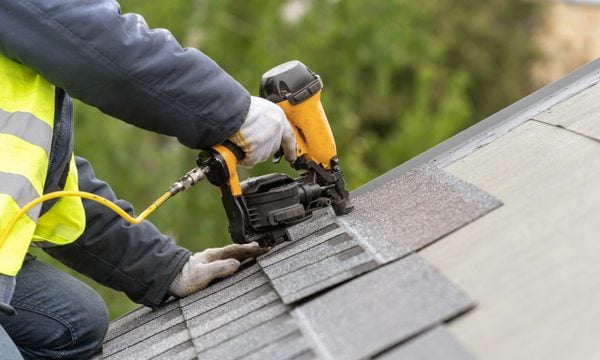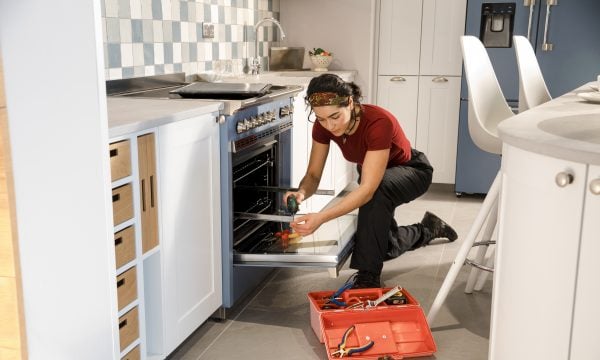Home Improvement: DIY or Hire a Pro?
For small, simple projects, a do-it-yourself approach could work. For complicated, risky jobs, call in a pro.
Some or all of the mortgage lenders featured on our site are advertising partners of NerdWallet, but this does not influence our evaluations, lender star ratings or the order in which lenders are listed on the page. Our opinions are our own. Here is a list of our partners.
A do-it-yourself home improvement project can save you money on labor costs and give you the satisfaction of fixing up your home with your own hands. However, some projects, especially complicated, time-consuming, or dangerous tasks, are better left to experts.
When deciding to hire a professional contractor, consider the time you would have to spend on the project, your experience and the difficulty of the job. For larger projects, such as remodeling, you may want to invest in a general contractor to manage subcontractors, or you can cut costs by hiring subcontractors yourself.
🤓 Nerdy Tip
If you hire a pro, get estimates in writing and ask for references. You should also confirm that the contractor has the licenses and insurance needed for the job. You can learn more about how to hire a reputable contractor from the Federal Trade Commission. Here are some tips to help you choose when to do it yourself and when to hire a professional.
Advertisement



HELOC & Home Equity Loans from our partners

on FourLeaf Federal Credit Union
FourLeaf Federal Credit Union 

Min. credit score
670
Max. loan amount
$1,000,000

on Achieve
Achieve 

Min. credit score
600
Max. loan amount
$300,000

on Figure
Figure 

Min. credit score
600
Max. loan amount
$750,000
When to try DIY
1. The project is small enough to learn quickly
If you want to paint your deck, for example, you may need to watch tutorial videos, read about paint choices, and ask paint sellers for advice. If you have the time to learn the steps and complete the project in a reasonable time frame, doing it yourself can make sense.
2. You have the patience to work through small mistakes
If you’re not a pro, expect that your DIY project won’t be perfect on the first try. You may have to make extra trips to the store because you didn’t correctly measure the amount of wood you needed, or you may discover your paint dried unevenly and need to start over to get the look you want. It’ll help if you’re flexible enough to work through minor errors.
3. You view home repair as a hobby
If you enjoy carpentry, painting and other renovation-related activities, you may enjoy a DIY project involving similar tasks. You may even find the process as enjoyable as the final result.
4. You’re okay with “good enough”
There’s a chance your project won’t turn out as well as a pro’s work. There may be some visible brushstrokes in a newly painted room, or some floor tiles may be slightly uneven. A small DIY job could be worthwhile if the problems are minor and you can live with the results.
5. The project is safe enough for a non-pro
No project that requires tools or physical labor is going to be entirely without risk, but some projects are more hazardous than others. Electrical work, for instance, can lead to fire or electrocution if done improperly and is better left to a licensed professional.
» MORE: How to save on home improvements
When to hire a home improvement contractor
1. A mistake would have pricey or dangerous consequences
If an error would make your home unsafe — faulty electrical wiring that could cause a fire, for example — it’s not worth the risk of doing it yourself. Outsource projects that could affect your family’s well-being or be expensive to correct if not done right.
Reputable contractors will have insurance and offer a warranty for their work, which protects you as the homeowner. If they make a mistake or, worse, damage your property, they’d pay to fix the problem.
2. The home renovation requires permits
Many localities require permits for electrical, structural and other major work. You’ll want to contact your city government and ask local contractors which remodel licenses are required in your area. These jobs generally require specialized knowledge, so it’s better to let a professional handle the work.
3. Your time’s better spent on something else
Paying a contractor can free you up for other activities, such as spending more time with your family. If you put a premium on those other activities, it makes sense to hire a professional.
4. You’re planning to sell your home
When you get ready to sell your house, you want it in the best condition possible. An amateur DIY job could be a turnoff for potential buyers and may even spark concerns that the home has other problems.
5. You’re remodeling
In some cases, you might do some parts of a remodel or upgrade yourself while also working with an expert. For example, you could decide to take on the role of general contractor for a significant project, such as a bathroom remodel, and hire subcontractors for specialized work, including electrical wiring, plumbing and cabinet installation.
Frequently Asked Questions
What are the most common DIY home improvement projects?
Popular home improvement projects to DIY instead of hiring a professional are typically fairly safe, easy to learn and forgiving of mistakes. These can include:
- Painting.
- Light fixture replacement.
- Installing shelves.
- Replacing cabinets, including changing hinges and hardware.
- Patios, decks and other outdoor features.
- Refinishing hardwood floors.
What home improvement projects should I hire a professional for?
Consider hiring a pro for major renovations, structural changes that require permits and anything that involves tricky electrical or plumbing work.
Cost of home improvements
As you plan your projects and determine what you’ll handle yourself, NerdWallet’s home improvement cost calculator can help you set a budget.
Can I get financing for a home repair or improvement?
Your contractor may offer some financing options (either through a partner or a payment plan), but there are other — and maybe better — financing options available.
Home equity loan or HELOC
Home equity loans or home equity lines of credit (HELOC) may have lower interest rates than financing with an installer, as well as future opportunities for refinancing and possible tax benefits.
With a home equity loan, you receive a lump-sum payment and then pay it back at a fixed interest rate over an agreed period of time, typically five to 30 years. HELOCs are more akin to a credit card, something you use as needed. You’ll usually have 10 years to draw from the line of credit, during which time you only have to pay interest, and after that you pay both the principal and interest. HELOC interest rates typically are variable, meaning your monthly payment could rise or fall over time. And with each of these options, you're using your home as collateral.
Personal loan
Many banks, credit unions and online lenders offer personal loans, with amounts typically from $1,000 to $100,000 and with fixed annual percentage rates. You receive a lump sum and repay it in equal monthly installments over a set period, typically two to seven years. Unlike with home equity financing, there is no collateral. This means your home isn’t at risk if you miss payments, but you’ll still have to pay late fees and the late payments can negatively impact your credit.
Credit card
Credit cards are an option for lower cost repairs or renovations. That’s because credit cards typically charge higher interest rates than home equity loans, HELOCs and personal loans. When used responsibly, credit cards can come with great benefits, such as 0% introductory APR periods that allow you to avoid interest for a set number of months; rewards so you can earn cash back, travel or points; and sign-up bonuses that can give you some extra cash back or rewards for a larger purchase. If you go this route, you’ll want to make sure you pick one of the best credit cards for home improvements.
Which financing option is best for me?
The best financing option for you will depend on how much money you need, when you need the money, what project you’re doing and how long you need to pay the money back. If it’s something that’ll add value to your home, a HELOC or home equity loan may be your best option because the value of your house could increase by more than the amount of the loan.
On the flip side, if it’s a less expensive repair, a credit card is probably your best option if you want to pay no interest or earn rewards. Personal loans can apply to both small and large repairs or renovations, and they may make sense if you don’t have much equity in your home.
Some home improvement contractors offer their own financing options. Before taking this option, shop around and see how their offer compares with other loans.
Regardless of what you choose, make sure you compare interest rates, terms and fees with any financing options you’re considering. This will ensure you get the best deal.
Advertisement
Min. credit score 600 | Min. credit score 600 |
Min. down payment N/A | Min. down payment N/A |
Article sources
NerdWallet writers are subject matter authorities who use primary,
trustworthy sources to inform their work, including peer-reviewed
studies, government websites, academic research and interviews with
industry experts. All content is fact-checked for accuracy, timeliness
and relevance. You can learn more about NerdWallet's high
standards for journalism by reading our
editorial guidelines.
More like this
Related articles











